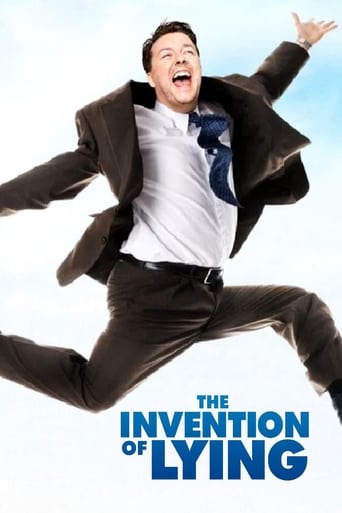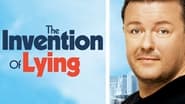Smoreni Zmaj
IMDb says comedy/fantasy/romance... it has elements of all 3, that's a fact, but it is not what determine this movie. I would say entertaining and occasionally funny satire of humanity, that hits some painful spots and makes you think about world we live in. It is not real comedy and definitely isn't real love movie. You can not say it is romance movie only because there are some people who fall in love in it. Still, like many times before, I think this is one fantastic idea wasted on mediocre movie. It could've been done much much better and I hope someone will try to make improved remake, cause it would be shame if this idea remains in this movie only. As much as I am amazed with the essence of the story, because of lousy realization I'll rate it 7/10.
Python Hyena
The Invention of Lying (2009): Dir: Ricky Gervais; Matthew Robinson / Cast: Ricky Gervais, Jennifer Garner, Jonah Hill, Rob Lowe, Louis C.K.: Here is an idea that needed anything behind it rather than what it has. It plays like the realization of the tree of Eden but deteriorates into endless boredom. Ricky Gervais lives in a world of no lying until under severe circumstances, he tells the first ever lie. Starts out with promise with numerous laughs until Gervais as director along with Matthew Robinson prove that they cannot balance humour and drama. Conclusion seems to denounce God as well. Whatever one's religious preferences are should not be the focus here but it seems like Gervais has an ax to grind. Gervais and Jennifer Garner, as his love interest lack chemistry. Gervais, to be fair, steals his moments as he tip- toes around this idea of lying but the third act wouldn't be any dumber than if it was replaced by episodes of Jackass. Garner is all too wrong for this material and never seems to fit. Jonah Hill has a role as a suicidal neighbor that might have worked in its own movie but here he is merely an afterthought. Rob Lowe is wasted as a rival co-worker with too much time on his hand. Louis C. K. also shows up as one of Gervais's friends but his humour doesn't surface strongly here. Strong theme regarding deception , which sums up this as a comedy. Score: 4 ½ / 10
Hossam Alaa
I think the concept is extremely smart. The cast is great and I really enjoyed watching the movie. Also the movie focused on two important parts the we see everyday:1-Judging other people from how they look. (Loser, fat, successful, bad husband ... etc) 2-How dangerous religion (whatever the religion is) can be, when it's not something personal. It discusses how you can be controlled and manipulated your whole life by someone who MIGHT be lying. **IMPORTANT** Just to be honest, if you feel offended by watching sarcastic scenes about religions, then I wouldn't recommend this movie for you.
giligara30492
I loved this film for its ideas, its writing, and its characters.THE IDEASIn this film, Ricky Gervais imagines a very simple alternate universe: people have never evolved the ability to lie (or censor themselves). Throughout the story, needlessly said, it becomes much more complicated than that. First, he shows how dishonesty, when one man is capable of it, can be both morally bankrupt (inventing "The Black Plague," the fantastical, literally unbelievable story that makes him famous) as well as morally good (when he lies to the banker to procure a homeless man money), independently of the hugely suggestible nature of everyone else on this film. This immediately has real-world resonance.Second, I admired the clever, satirical, but overall succinct way he dove into the birth of religious faith (in this case contextualised as the Judeo-Christian faith): a grieving man, Mark, who doesn't want his agonising mother to be afraid of death, does a very human thing, which no one in this universe has been capable of doing before. He tells her a lie, invents heaven, for both their comforts. Now, the brilliant bit is that it doesn't feel like satire at all at this point: it feels real. Like this is a very probable hypothesis to explain why the concept of heaven arose. And I must agree with Ricky on this.The invention, of course, goes further. When Mark is pushed into explaining what he knows and how, though (funny how even gullible people seem to need some sort of evidence), he is backed against a wall with the whole of the human race patiently waiting on him, and comes up with "The Man In The Sky" (TMITS). The man who controls everything and both gives people cancer and cures them, capsizes boats and saves the drowning man. If it seems a half-arsed concept, is because, to Ricky, and most atheists like myself, it is. I would imagine the hilarious satire here is clumsy at best in the eyes of a theist, but, really, Ricky does a fantastic job of pinning down both the atheist take on the moral argument (people immediately need guidance on good and bad when faced with the knowledge of TMITS, when they haven't needed it for the whole of human evolution)as well as the problem of evil (TMITS "is kind of a good guy, but he's a prick, too"). In this universe, the rise of churches and diverging doctrines and everything else, of course, is not far off after the initial "discovery" of TMITS. Also funny how Mark creates hell out of basic annoyance at the people pressing him for answers.Finally, I thought another well-put idea of the film is that whilst morality is complex, and people can and do use lies for personal gain and for altruistic purposes, morality is ultimately and foremost, a human construct. Mark, for example, could have easily convinced Anna to get together romantically with him by answering "yes" when she asked him whether being rich and famous would affect the genetic material of their potential offspring. He could have said to Frank, his suicidal neighbour, that he thought him truthfully a loser. But he doesn't. His reaction is "no" to the first, and "killing yourself is a bad idea; let's hang out" to the second. Also, he's intellectually honest in another respect that makes him different from seemingly everyone else in the film: he allows himself to seek out the truth about people in depth, beyond their appearances. And since there is no external morality (TMITS is merely Mark's invention), these moral things he does must be a product of his human empathy, his sense of compassion, his recognition of sentience outside ourselves deserving of respect. It's a human construct.THE WRITINGNot much to say here. Ricky's smart-arse wit was there throughout. The callousness and hilarity of the truths and the absurdity of the lies was very well done.THE CHARACTERSMark Bellison (Ricky Gervais) is a mercilessly advantageous, cunning bastard who's also kind and compassionate. I like him. Anna McDoogles (Jennifer Garner) is a superficial girl who grows throughout the film by getting to see beyond appearances. She ends up giving Mark a chance and finding out that she does like him for him after all. I liked their relationship, too.I suggest watching if you like wit, satire, and thoughtful comedy. It could have been nonsense, but Ricky's way too smart for that -- he made it mean so much more than its premise. A testament to the effectiveness of simplicity.





